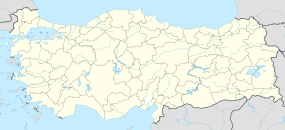Tyana

The Roman aqueduct of Tyana
|
|
| Location | Kemerhisar, Niğde Province, Turkey |
|---|---|
| Region | Cappadocia |
| Coordinates | 37°50′53″N 34°36′40″E / 37.84806°N 34.61111°ECoordinates: 37°50′53″N 34°36′40″E / 37.84806°N 34.61111°E |
| Type | Settlement |
| Site notes | |
| Condition | In ruins |
Tyana or Tyanna (Ancient Greek: Τύανα, Hittite Tuwanuwa) was an ancient city in the Anatolian region of Cappadocia, in modern Kemerhisar, Niğde Province, Central Anatolia, Turkey. It was the capital of a Luwian-speaking Neo-Hittite kingdom in the 1st millennium BC.
Tyana is the city referred to in Hittite archives as Tuwanuwa. During the Hittite Empire period in mid 2nd millennium, Tuwanuwa was among the principal settlements of the region along with Hupisna, Landa, Sahasara, Huwassana and Kuniyawannni. This south-central Anatolian region was referred to as the Lower Land in Hittite sources and its population was mainly Luwian speakers. Following the collapse of the Hittite Empire, Tuwanuwa/Tuwana was a major city of the independent Neo-Hittite kingdoms. It is not certain whether or not it was initially subject to the Tabal kingdom to its north, but certainly by the late 8th century BC it was an independent kingdom under a ruler named Warpalawa (in Assyrian sources Urballa). He figures in several hieroglyphic Luwian inscriptions found in the region, including a monumental rock carving in Ivriz. Warpalawa is also mentioned in Assyrian texts, under the name Urballa, first in a list of tributees of Assyrian king Tiglath Pileser III and later in a letter of Sargon II. Warpalawa was probably succeeded by his son Muwaharani whose name appears in another monument found in Niğde.
In Greek legend, the city was first called Thoana because Thoas, a Thracian king, was its founder (Arrian, Periplus Ponti Euxini, vi); it was in Cappadocia, at the foot of the Taurus Mountains and near the Cilician Gates (Strabo, XII, 537; XIII, 587).
...
Wikipedia

